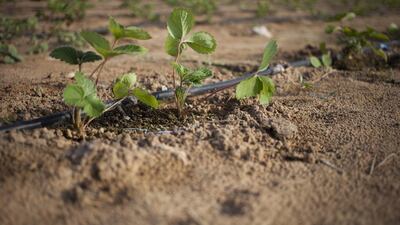As the country’s devout come together in mosques to pray for rain on Tuesday morning, farmers across the UAE have said they have been forced to stop planting crops and in some case abandon their plots of land altogether due to a lack of water.
Mohammad Al Darmaki, a farmer from Kalba, said the problem has gotten so bad he has stopped working on his land. He said more dams to trap any rain water and desalination equipment could help ease farmers problems.
“We did everything in order to keep our farms, we provided many suggestions like more dams, wells and on top of them the need for a desalination plant in the area especially for farming as the water resources became less and less,” said Mohammad Al Darmaki, a farmer from Kalba.
“I stopped planting any trees and many farmers did so, you can’t plant anything without water, water is life and without it everything dies,” said the 60 year-old. “Desalination devices are expensive, I used to have a vegetable and palm tree farm but not anymore and I wish one day that they could solve the water problem in order to bring our farms to life again.”
_______________________________________________________
Also read: Men, women and children asked to join in prayers for rain at mosques across UAE
_______________________________________________________
Salem Al Dahmani said his parents abandoned their Kalba farm many years ago due to the lack of water supplies.
“After they abandoned the farm I decided to help them go back and grow crops but it wasn’t an easy task as it requires the help of the authorities to either build a desalination plant or help farmers to switch to the hydroponics system,” said Mr Al Dahmani, 36.
“Without rain the task becomes harder and ground water decreases which also affects farmers and their crops.”
A farmer from Dibba said most of his colleagues in the area rely on groundwater supplies stored in wells and help each other when there is a lack of rain.
“I grow many kinds of vegetables and fruits along with the dates, water has been always an issue to us and with the recent lack of rainfall the issue is becoming more complicated as many of us rely on wells,” said Ali Al Abudily. “If I don’t have enough water I borrow from my neighbours and they do the same.”
Hundreds of kilometres away, farmers in Abu Dhabi said they face similar problems.
Yasir Al Mahri, who supervises his father and brother’s farms in Suweihan, said he stopped planting hey grass and alfaalfa grass because it needs a lot of water. When there is not enough reserve (or ground) water from rainfall, he uses treated water provided by the government.
“We don’t like to use this water excessively because the government pays a lot of oil and energy for it.”
Rainfall is also crucial to balance the salt level of groundwater, said Mr Al Mahri. “Rain enters the ground and reduces the salt level in the water, so the crop increases and is of better quality.”
He also planned to join the rain prayers, known as Istisqaa, on Tuesday at 7.30am.
“The issue is not about the late rainfall only, in general it is a sunnah to perform Istisqaa prayers, and Sheikh Khalifa instructs that is it performed every year,” he added.
A ground water engineer said water taken from dams can only be replenished by rainfall.
“No matter how much rain we get the consumption is 25 per cent more than the available therefore farmers should think of alternative methods like using the hydroponics system or install a modern irrigation system to conserve water,” said Eng Abdullah Al Ghasmi. “They should also consider changing some habits that may affect the water consumption.
“Climate change had affected the world and the rain levels but we are still in the mid of the season and we can judge on anything yet until the season ends.”
According to the National Centre of Meteorology & Seismology, there was heavy rainfall levels January to March last year, more than the same period in 2015. However, on a whole the country experienced a lack of rainfall last year compared to 2015.
On Sunday, President Sheikh Khalifa called for a prayer for rain, known as Salaat Al Istisqaa, to be performed in all mosques and musallahs across the country at 7.30am on Tuesday.
He called on all Muslims in the country to pray to Allah to bless the land with rain and mercy, in accordance with the Prophet Mohammed’s Sunnah Course.
rhaza@thenational.ae
hdajani@thenational.ae

